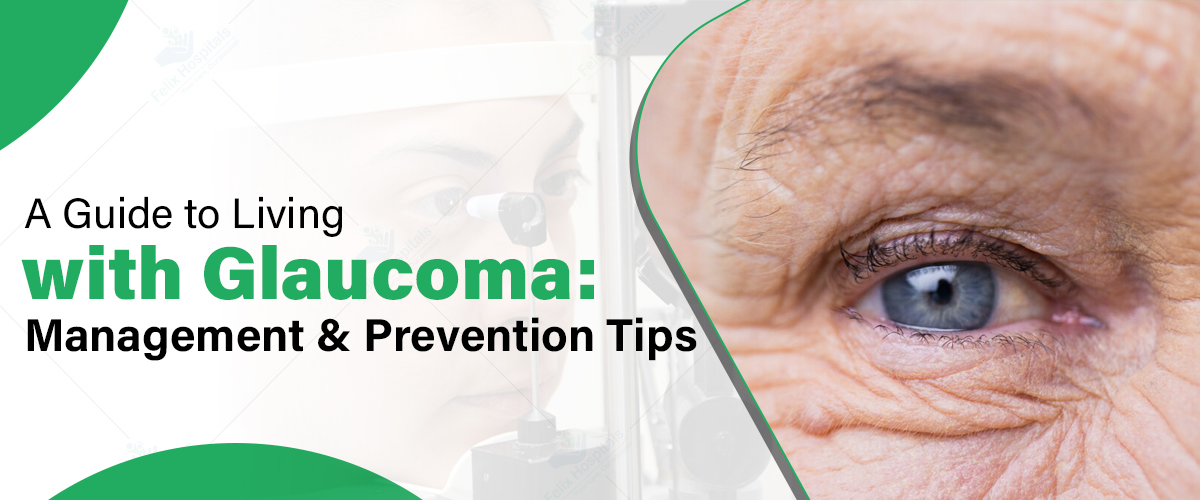
Subscribe to our

Glaucoma is often called the "silent thief of sight" due to its gradual and often unnoticeable progression. As one of the leading causes of blindness worldwide, glaucoma affects millions of people, particularly those over 60 years of age. However, with proper management and preventive measures, individuals with glaucoma can maintain their quality of life and preserve their vision. This guide aims to provide comprehensive information on living with glaucoma, including management strategies and prevention tips.
Concerned about Glaucoma? Schedule your consultation with our experts today at +91 9667064100.
Before discussing how to manage or prevent glaucoma, it's crucial to understand what glaucoma is. Glaucoma is a group of eye conditions that damage the optic nerve, which is vital for good vision. This damage is often caused by abnormally high pressure inside the eye. There are several types of glaucoma, with open-angle glaucoma being the most common.
Many people don't realize they have it until significant vision loss has occurred. This emphasizes the importance of regular eye check-ups, especially for those at higher risk.
1. Medication Adherence
The cornerstone of glaucoma management is usually medication, often in the form of eye drops. These medications work to lower intraocular pressure. It's crucial to:
2. Regular Eye Exams
Consistent follow-ups with your ophthalmologist are essential. These visits allow your doctor to:
3. Lifestyle Modifications
Certain lifestyle changes can support overall eye health including:
4. Stress Management
Stress can impact overall health, including eye health. Techniques such as meditation, deep breathing exercises, or yoga can help manage stress levels.
5. Protective Eyewear
Wearing sunglasses that block UV rays can protect your eyes from harmful sun exposure. Additionally, protective eyewear during sports or potentially hazardous activities can prevent eye injuries.
While some risk factors for glaucoma, such as age and family history, can't be changed, there are steps you can take to reduce your risk or slow the progression if you've been diagnosed. These steps include:
1. Regular Eye Exams
Early detection is key. The American Academy of Ophthalmology recommends comprehensive eye exams in:
Those with risk factors may need more frequent exams.
2. Know Your Family History
Glaucoma can run in families. If you have a family history of glaucoma, inform your eye doctor and consider more frequent check-ups.
3. Maintain a Healthy Weight
Obesity can increase the risk of diabetes and other systemic health problems, which in turn can increase the risk of glaucoma.
4. Control Blood Pressure
High blood pressure can increase the risk of glaucoma. Work with your doctor to keep your blood pressure in a healthy range.
5. Stay Hydrated
Proper hydration is important for maintaining healthy eye pressure. However, avoid drinking large amounts of water in a short time, as this can temporarily increase eye pressure.
6. Be Cautious with Eye Makeup
If you use eye makeup, be careful not to injure your eyes during application. Replace eye makeup regularly to prevent bacterial growth.
Vision Changes
Glaucoma often affects peripheral vision first. This can impact daily activities like driving or navigating crowded spaces. Some helpful strategies include:
Driving
If glaucoma affects your ability to drive safely, consider:
Reading and Computer Use
For those experiencing difficulty with reading or screen use:
Emotional Impact
Living with a chronic condition like glaucoma can be emotionally challenging. Do not hesitate to:
Staying Active
Physical activity is beneficial for overall health and can help manage glaucoma. However, certain high-intensity exercises may temporarily increase eye pressure. Consult your doctor about which activities are safe for you.
Dr. Deepanjali Arya
Dr. Deepanjali Arya is a leading ophthalmologist specializing in glaucoma. Her expertise in both medical and surgical glaucoma treatments ensures effective management of this condition.
Dr. Mohmad Uzair Zakai
Dr. Mohmad Uzair Zakai is a renowned ophthalmologist with a focus on glaucoma care. His advanced techniques and personalized approach make him a top choice for treating complex glaucoma cases.
Living with glaucoma requires vigilance and proactive management, but it doesn't have to significantly diminish your quality of life. By adhering to your treatment plan, making healthy lifestyle choices, and staying informed about your condition, you can effectively manage Glaucoma and preserve your vision. Remember, every individual's experience with glaucoma is unique. What works best for one person may not be ideal for another. Always consult with your eye care professional to develop a management plan tailored to your specific needs.
Unsure about your glaucoma risk? Get personalized guidance and expert care at one click or dial +91 9667064100.
1-At what age can glaucoma begin?
ANS: Glaucoma can develop at any age, but it is more common in people over 40. Risk increases with age, making regular eye exams important for early detection.
2-Is glaucoma considered a serious condition?
ANS: Yes, glaucoma is a serious condition as it can lead to irreversible vision loss if not managed properly. Early diagnosis and treatment are crucial to controlling the disease and preserving vision.
3-How can eye pressure be reduced quickly?
ANS: To quickly reduce eye pressure, follow your doctor’s prescribed treatment plan, which may include medication or eye drops. In emergencies, medical professionals might use more intensive methods or procedures to lower pressure.
4-When is the optimal time to use glaucoma eye drops?
ANS: The best time to use glaucoma eye drops is usually in the evening, just before bedtime, as this helps maintain consistent pressure control overnight. Always follow your doctor’s specific instructions for timing and dosage.
5-How long does glaucoma typically last?
ANS: Glaucoma is a chronic condition that usually lasts a lifetime. While it can be managed with treatment, it requires ongoing monitoring and medication to control eye pressure and prevent further vision loss.
6-Can glaucoma drops improve vision?
ANS: Glaucoma drops do not improve vision but are effective in stabilizing eye pressure to prevent further vision loss. They help manage the condition and preserve existing vision.